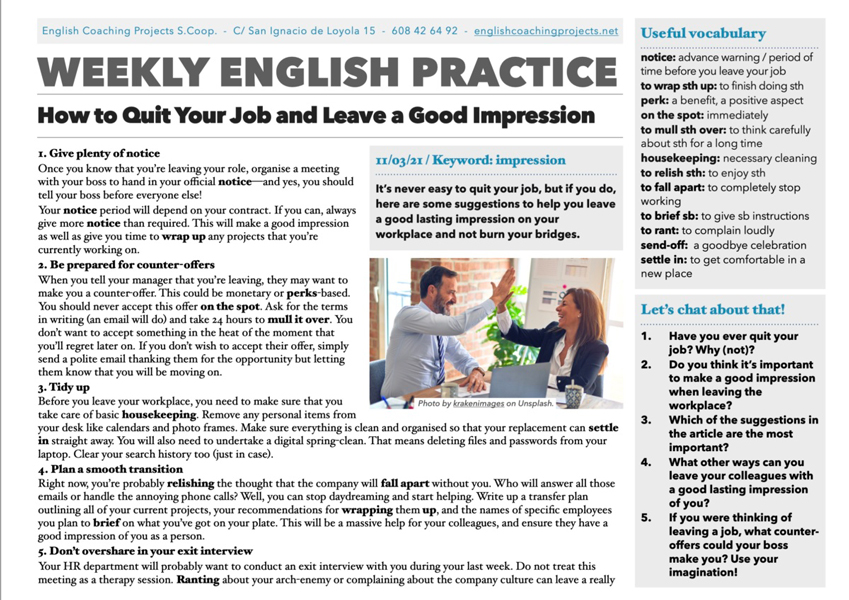How to Quit Your Job and Leave a Good Impression
11/03/21 / Keyword: impression
It’s never easy to quit your job, but if you do, here are some suggestions to help you leave a good lasting impression on your workplace and not burn your bridges.
Click HERE to download the Weekly English Practice as a PDF.
Useful vocabulary
notice: advance warning / period of time before you leave your job
to wrap sth up: to finish doing sth
perk: a benefit, a positive aspect
on the spot: immediately
to mull sth over: to think carefully about sth for a long time
housekeeping: necessary cleaning
to relish sth: to enjoy sth
to fall apart: to completely stop working
to brief sb: to give sb instructions
to rant: to complain loudly
send-off: a goodbye celebration
settle in: to get comfortable in a new place
Listen to the audio and read the text (refresh the page if it’s not visible).
It’s never easy to quit your job, but if you do, here are some suggestions to help you leave a good lasting impression on your workplace and not burn your bridges.
1. Give plenty of notice
Once you know that you’re leaving your role, organise a meeting with your boss to hand in your official notice—and yes, you should tell your boss before everyone else!
Your notice period will depend on your contract. If you can, always give more notice than required. This will make a good impression as well as give you time to wrap up any projects that you’re currently working on.
2. Be prepared for counter-offers
When you tell your manager that you’re leaving, they may want to make you a counter-offer. This could be monetary or perks-based. You should never accept this offer on the spot. Ask for the terms in writing (an email will do) and take 24 hours to mull it over. You don’t want to accept something in the heat of the moment that you’ll regret later on. If you don’t wish to accept their offer, simply send a polite email thanking them for the opportunity but letting them know that you will be moving on.
3. Tidy up
Before you leave your workplace, you need to make sure that you take care of basic housekeeping. Remove any personal items from your desk like calendars and photo frames. Make sure everything is clean and organised so that your replacement can settle in straight away. You will also need to undertake a digital spring-clean. That means deleting files and passwords from your laptop. Clear your search history too (just in case).
4. Plan a smooth transition
Right now, you’re probably relishing the thought that the company will fall apart without you. Who will answer all those emails or handle the annoying phone calls? Well, you can stop daydreaming and start helping. Write up a transfer plan outlining all of your current projects, your recommendations for wrapping them up, and the names of specific employees you plan to brief on what you’ve got on your plate. This will be a massive help for your colleagues, and ensure they have a good impression of you as a person.
5. Don’t overshare in your exit interview
Your HR department will probably want to conduct an exit interview with you during your last week. Do not treat this meeting as a therapy session. Ranting about your arch-enemy or complaining about the company culture can leave a really bad impression. Instead, keep your criticism constructive. You might mention a few things that the company could work on, but keep the overall tone happy and positive.
6. Be proud
Take a moment to pat yourself on the back. If you’ve successfully worked your notice period and are still on great terms with all your colleagues, then consider it a success!
In addition, it’s always a nice touch to send a goodbye email to your co-workers, especially if they gave you a nice send-off. Showing gratitude, manners and professionalism will make sure that they remember you fondly.
Adapted from: www.independent.ie by ECP coach Alison Keable
Let’s chat about leaving a good impression!
- Have you ever quit your job? Why (not)?
- Do you think it’s important to make a good impression when leaving the workplace?
- Which of the suggestions in the article are the most important?
- What other ways can you leave your colleagues with a good lasting impression of you?
- If you were thinking of leaving a job, what counter-offers could your boss make you? Use your imagination!
Take a moment to look at these related articles!
Why I came to live and work in Vitoria-Gasteiz

